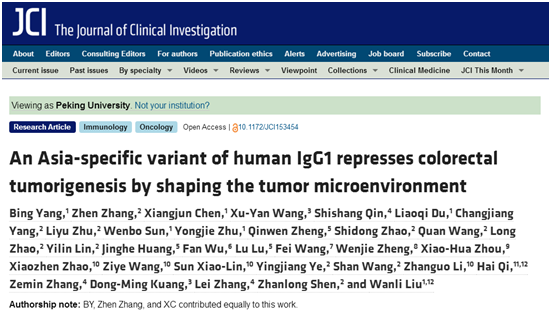Gastroenterological Surgery | Prof. Shen Zhanlong’s Team Identifies Protective Role of hIgG1-G396R Variant for Tumor Progression and Survival in CRC Patients
2022-03-28
On March 15th, 2022, the Journal of Clinical Investigation published a collaborative research by Prof. Shen Zhanlong’s team from the Department of Gastroenterological Surgery at Peking University People’s Hospital, and Prof. Liu Wanli’s team from the School of Life Sciences at Tsinghua University. The research, “An Asian-Specific Variant in Human IgG1 Represses Colorectal Tumorigenesis by Shaping the Tumor Microenvironment”, found that an Asia-specific variant of human IgG1 containing a Gly396 to Arg396 substitution (hIgG1-G396R) conferred improved survival of patients with colorectal cancer (CRC). In addition, the research also analyzed the mechanism and potential values of IgG1 memory B cells in shaping the tumor microenvironment to repress colorectal tumorigenesis.

The researchers, based on survival analyses of 1006 CRC patients, investigated the correlation of the hIgG1-G396R variant with clinical colorectal tumorigenesis and identified a protective role of the hIgG1-G396R variant for tumor progression and survival in CRC patients, which was readily recapitulated in multiple murine tumor models. As the underlying mechanism, the authors found enhanced TAA-specific plasma cell differentiation and antibody production in both variant-harboring CRC patients and genetic knockin mice. The potentiated TAA-specific antibody in turn drove antibody-dependent tumor cell phagocytosis and effective presentation to evoke cytotoxic CD8+ T cell responses, shaping the TME to boost immune machinery for tumor cell killing. At the clinical end, the adoptive transfer of variant-harboring memory B cells facilitated tumorigenesis suppression. Collectively, the study provided insightful clues about the potential clinical benefits of a germline coding variant in human IgG1 and the manipulation of IgG1+B cells in tumor immunotherapy. Thus, harnessing human IgG1+ memory B cells in the TME could be a powerful strategy for cancer immunotherapy.
Dr. Yang Bing, from Prof. Liu Wanli's team, Dr. Zhang Zhen, from Prof. Shen Zhanlong’s team, and Dr. Chen Xiangjun, from Prof. Liu Wanli’s team are the co-first authors of the paper. Prof. Liu Wanli, from the School of Life Sciences at Tsinghua University and Prof. Shen Zhanlong, from the Department of Gastroenterological Surgery at Peking University People’s Hospital are the corresponding authors of the paper.
Paper Link: https://www.jci.org/articles/view/153454

